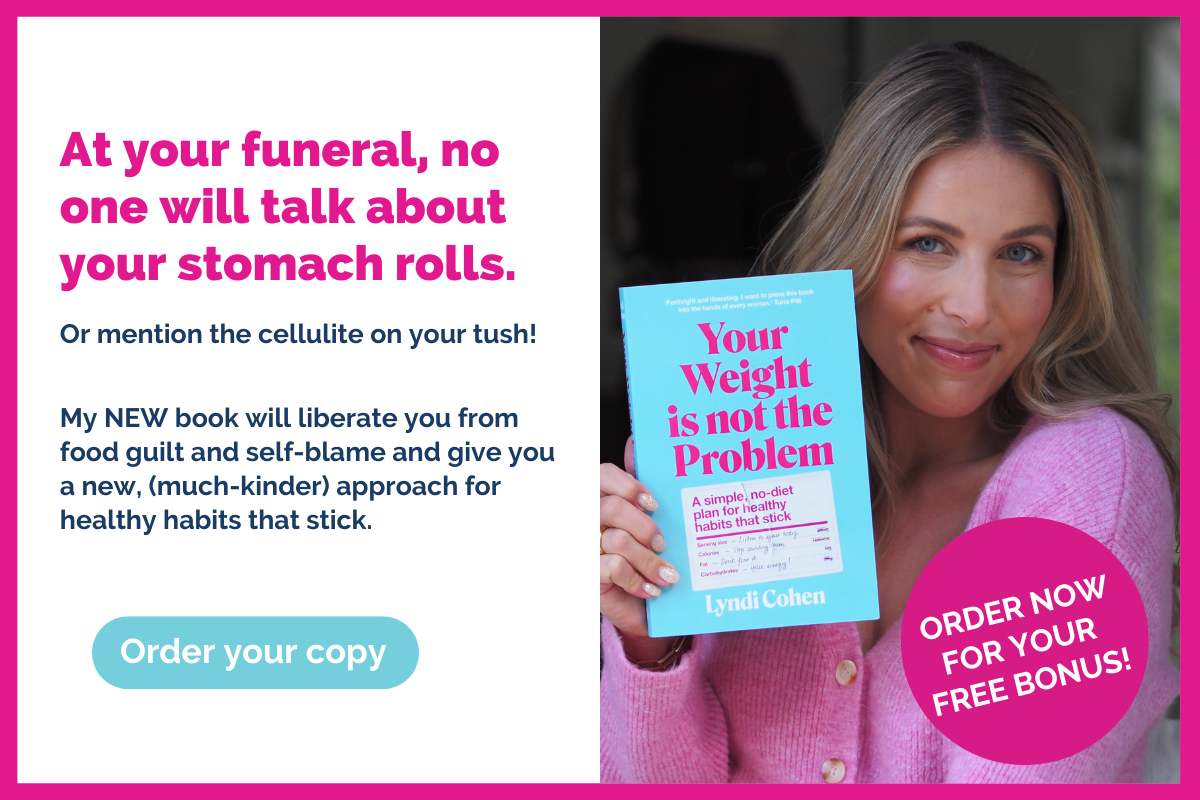Should you comment on your daughter’s weight? Before you do, read this blog post to fully understand how to talk to your daughter about her weight without causing any damage.
Firstly, thank you for being here.
Whether you googled “How to talk to your daughter about her weight” or clicked on the link in my newsletter, you’re here for a reason – and it’s a good one.
You love your daughter. And you want what’s best for her.
(…or maybe you have a son whose weight you’re worried about – and if so – this blog post is still relevant for you).
Should I tell my daughter she needs to lose weight?
Maybe you’re afraid she’ll be bullied or experience discrimination at school – or later in her life. Maybe the same thing happened to you, and you really don’t want that for her.
Ultimately, you’re trying to protect her.
Because the sad truth is we live in a world where we’re told there is a “right” weight. Being labelled “thin” is a compliment, but the words “fat” or “overweight” are feared.
But there’s a more important thing to consider:
There is NO way you can comment on your daughter’s weight without causing damage (ref). If you do, your child will only hear one thing – “I am not good enough”.
And that belief is more harmful than any outside bullying or judgement could ever be. It will become a part of her. She will internalise it, and it will sink deep into her bones.
The bullies you’re afraid of will live in her mind. And this internal, self-loathing bully is far harder to notice and trickier to deal with.
What’s more: commenting on your daughter’s weight will most likely backfire.
Research shows that teenagers whose parents comment on their weight are 66% more likely to be overweight or obese as adults.
Studies show that commenting on your daughter’s weight majorly boosts her chance of not liking her body – regardless of what she weighs. It can also put her at a higher risk for eating disorders including binge eating disorder.
So, friend, the answer to your question “should I comment on my daughter’s weight??“
No. As a dietitian and nutritionist who specialises in eating disorders and body image (who also grew up believing she was never thin enough), I have no doubt in my mind when I say that you should not comment on your daughter’s weight.
Your daughter is probably already really aware of her body shape. Research shows that girls as young as six already have the desire to be thin. Scary, isn’t it?
I believe that for generations, parents have unknowingly passed down disordered eating advice to their children. And it’s about time we ended that cycle.
Instead of commenting on your daughter’s weight, help her create a healthy relationship with food and her body. You find 4 powerful strategies to do just that below.
1. BE HER ROLE MODEL
We’ve all heard the saying, “Put on your oxygen mask first.”
The same applies here.
Before you can expect your daughter to have a healthy relationship with food and her body, you must first do the same. Because the wonderful truth is that you are her biggest and most important role model.
Take my quiz What kind of eater are you? to get an instant assessment of your eating style, then answer the questions below.
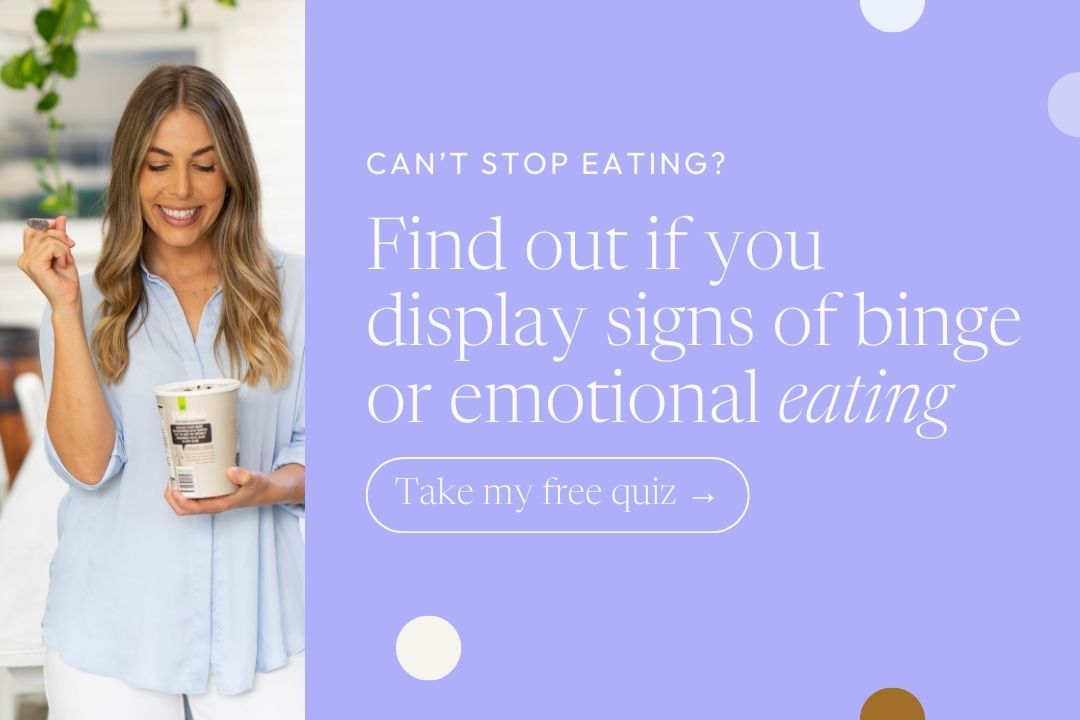
Check-in with yourself for a moment:
- Do I talk negatively about my body? – “I hate my thighs”
- Do I comment on the weight of other women? – “Wow, she’s really let herself go!”
- Do I shame myself after eating certain foods? – “I feel so gross, I can’t believe I ate pizza last night.”
- Do I label foods as good or bad? – “I’ll be naughty and have some cake.”
If you answered yes… congrats! You’re human! And I totally get it. I used to be all-or-nothing with health, too. I was either ‘dieting’ or eating ice-cream from the tub.
The thing is, my parents commented on my weight for as long as I can remember.
I was always bigger than the other girls in my class, so my parents wanted to protect me from all the things associated with being the “wrong weight”.
But instead of helping, this lack of acceptance drove me to eat in private, diet obsessively, starve myself, binge and over-exercise in order to feel good enough.
Honestly? I don’t blame them.
They thought they were doing what was right for me. And it’s a pattern they learned from their own parents.
But you, reading this, are more informed now. You asked the question. You don’t have to repeat the same mistakes. You can break the cycle of disordered eating in your family – starting with yourself.
I know it’s really hard to have a healthy relationship with food and your body in this diet-obsessed world – so if you need a little help to see how it’s done check out my program Binge Free Academy.
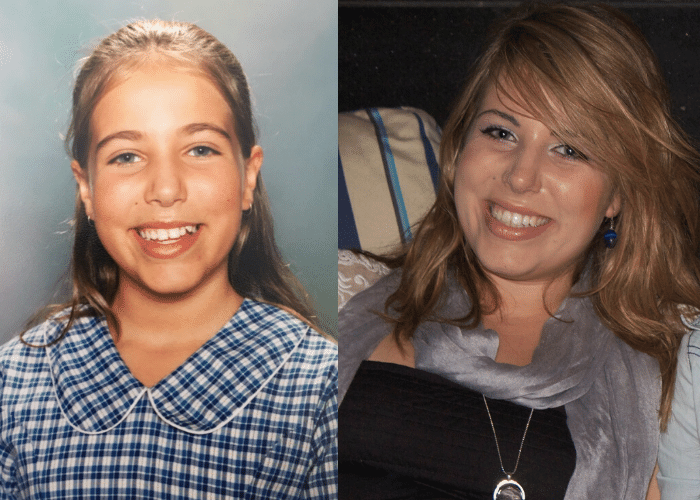
2. PUT YOURSELF IN HER SHOES
Imagine how you’d feel if someone you loved said hurtful things about how you looked, every day.
Or constantly told you to stop eating because you’ve had “enough”.
Maybe you don’t have to imagine it. Maybe someone said those same things to you once upon a time.
Sure, it may have motivated you to temporarily start another diet, wear baggier clothes or go for an hour-long run.
But ultimately it will earn you a Masters in Disordered Eating and a PhD in Self-loathing*.
So when judgemental words start bubbling up, stop and really think about how it would feel to be on the receiving end.
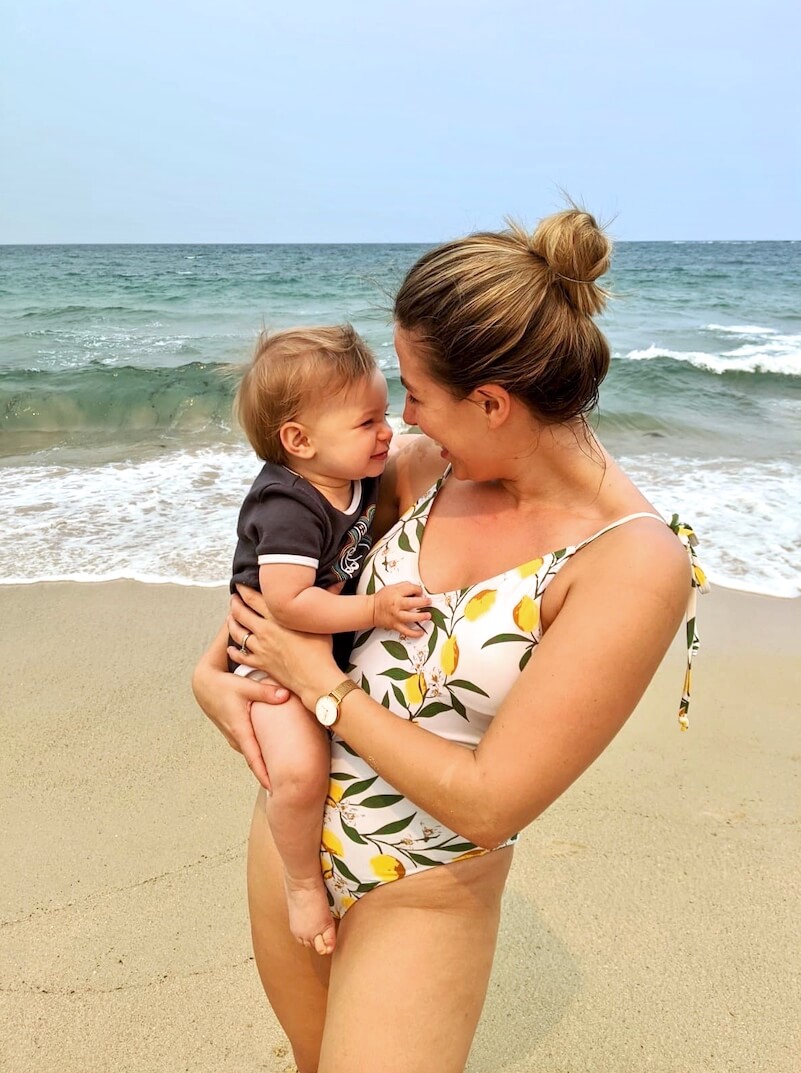
Want practical tips on how to raise kids with a healthy relationship with food? You’ll love this blog post!
3. INTRODUCE CROWDING
Crowding is as simple as it is effective:
Focus on the foods you want to eat more of, not the foods you want to avoid.
In other words, instead of telling your daughter what she can’t eat, shift the focus to all the great things she can eat.
For example:
- Aim to make veggies, whole grains, lean protein and healthy fats the hero of the family plate.
- Invite your daughter to help you prepare dinner a few times a week, or ask her what she’d like to make for family dinner and get the ingredients ready for her to have a go (you find plenty of free recipes on my website).
- Kickstart Meal Prep Sundays together to make a week’s worth of tasty, healthy meals for the whole family. Check out Back To Basics for a new Meal Prep Power-Hour video every week!
- Ask her what her favourite foods are, and research some fun and unique ways you can include them into your go-to’s.
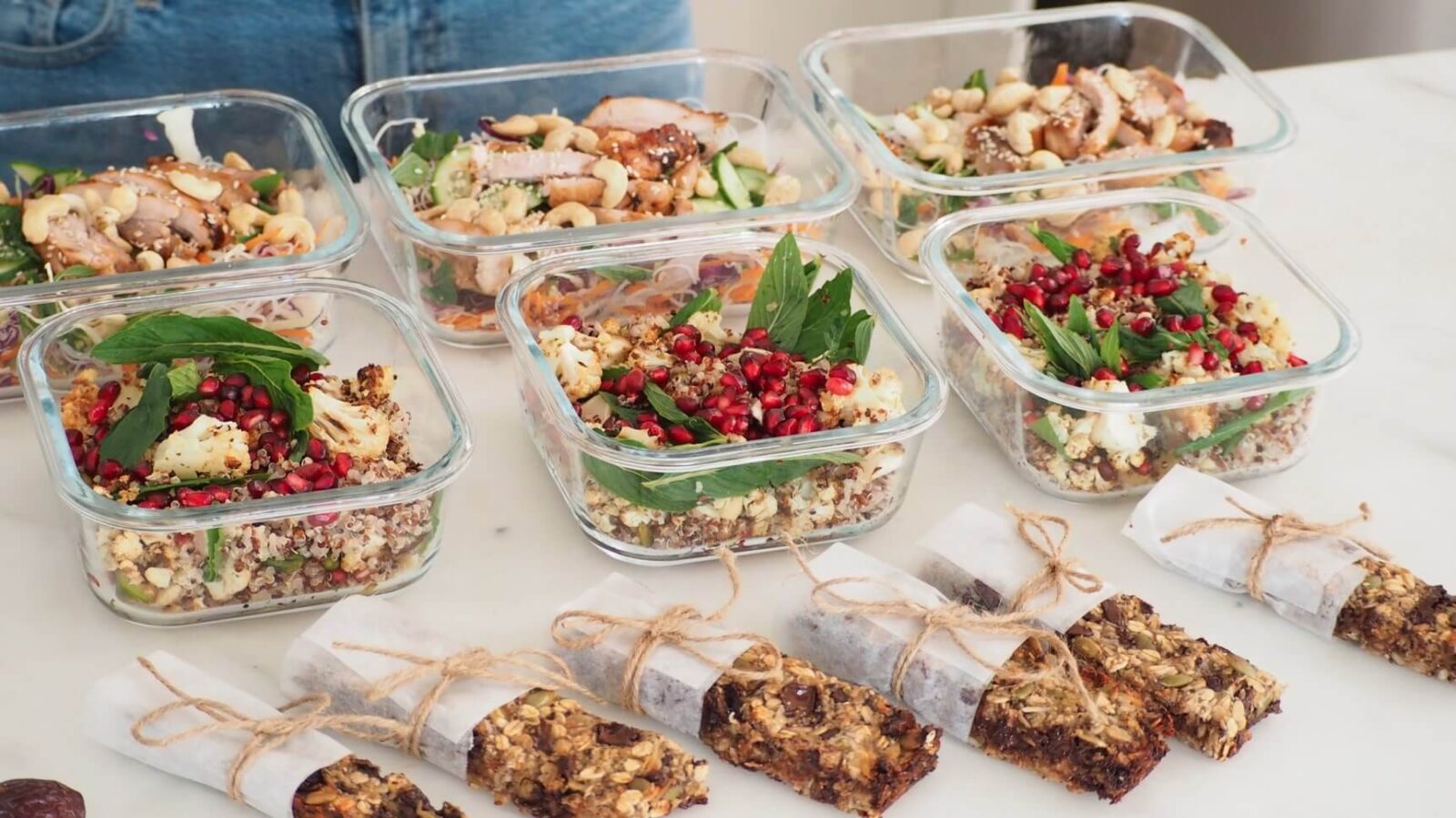
Here’s the thing: focusing on forbidden foods makes you want to eat them more, which encourages overeating, eating in secret and eating with a whole lotta shame on the side.
Focus on your daughters health – not her weight
It also makes it hard to notice your hunger cues – eating when you’re hungry and stopping when you’re full.
But by championing the healthy stuff and including your daughter in the cooking process, you will empower her to learn what she enjoys cooking and eating, get curious about how different foods make her feel, and realise that there’s no such thing as “good” or “bad” food – just “sometimes” foods.
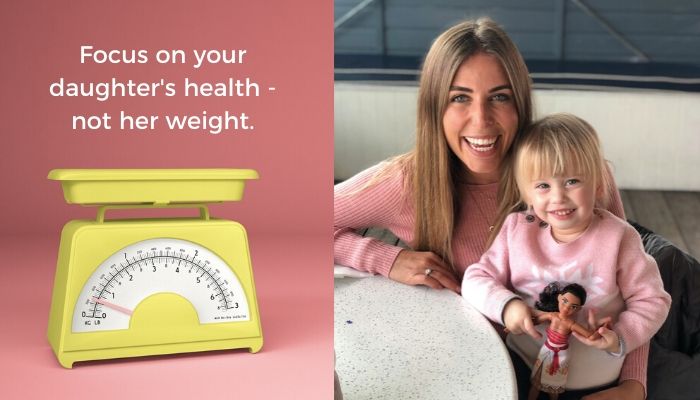
4. ACCEPT YOUR DAUGHTER WILL NEVER BE A SUPERMODEL
Her body, just like yours, is not perfect.
And that’s okay.
Just like you, she will take bad photos, have less flattering angles, and have breakouts.
And no matter how hard you try to protect her, she may still spend a lifetime learning how to accept her body – despite all the messages from society telling her that she shouldn’t.
So instead of comparing her to all the heavily photoshopped women you see on social media, remind yourself that everybody is different.
And that her body, just like yours, is perfect, just the way it is.
I’d love to see you in my Back to Basics community, a deliciously realistic and healthy approach to life you can (actually) stick to. Get fresh, easy 20-minute recipes daily, plus weekly workouts and inspirational videos to help keep you on track.
I’ll be doing it right along with you!
LEARN MORE ABOUT BACK TO BASICS
Related resources:
[On the podcast]
- Accidentally gave your child body image issues? Listen to this.
- How NOT to pass an unhealthy food relationship to your kids
- Does your mum criticise your body?
[On the blog]
- My healthy eating class lesson for Kindergarten kids
- How to teach kids to eat healthily
- 10 things to avoid to raise kids with a healthy relationship with food
[Offline]
If you want to stop handing down disordered eating like a family heirloom and raise kids who have a healthy relationship with food and their bodies – read my book Your Weight is Not the Problem. It’s been ranked the #1 Women’s Health book on Amazon for 10 weeks straight and is probably the best investment you’ll make in your health for under $30.
Get the deets and access to a free audio sample of the book HERE.
